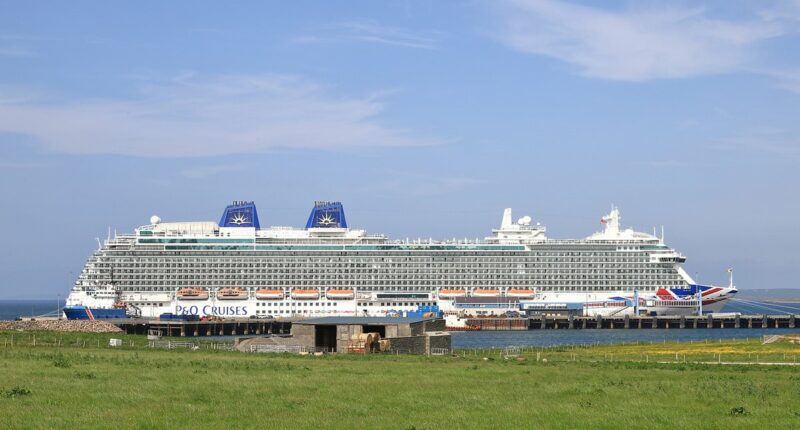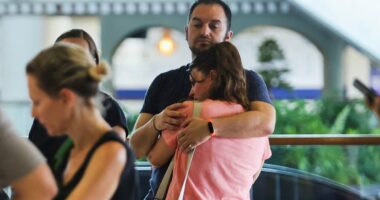Share this @internewscast.com
Residents of a remote Scottish island are feeling overwhelmed by the influx of thousands of unruly tourists each year. The situation has become so dire that some visitors have resorted to relieving themselves near ancient Neolithic sites.
Despite its small population of just 22,000, Orkney, known for receiving mental health support during the bleak off-season, is now grappling with the pressures of increased tourism.
During the peak tourist season from May to October, cruise ships disembark approximately 6,000 visitors on the island. This is in addition to regular flights from Glasgow, Aberdeen, and Edinburgh, as well as ferries that bring even more travelers, significantly boosting the island’s population.
At the height of this influx, the island hosts 20 tourists for every local, leading to overcrowded walkways, congested roads, and damage to its cherished tourist sites.
Visitors arriving by coach to see attractions such as the Neolithic Ring of Brodgar face a shortage of restroom facilities, resulting in unpleasant situations.
Locals argue that these issues highlight the urgent need for financial investment in infrastructure if Orkney is to continue accommodating the approximately 450,000 visitors it receives each year.
Amid the concerns of overtourism, the Scottish government in Hollyrood has come up with a solution: taxing the incomers at their accommodation on the island, whether that be hotels, B&Bs or campsites.
But the proposal has left a sour taste in the mouths of some locals – despite the sweetness of their famous fudge.

Orkney residents living on the remote Scottish island claim they are under siege from tourists

In the summer season, regular cruise ship traffic can lead to tourists outnumbering islanders by 20/1

Locals say a proposed £5 tourist tax could actually do more to harm the island than help it

But in the winter, conditions on the island get so dour that many locals are forced to take advantage of free mental health care
Speaking to the Daily Mail, a Stromness local who didn’t wish to be named said: ‘It’s as bad as it can be. I mean, there are no toilet facilities at the Ring of Brodgar and Ness of Brodgar so you get elderly people squatting in ditches and things.
‘There are no toilet facilities there and that’s the fault of the local council and tourist industry.’
They added: ‘The number of people who are coming into us on the cruise ships, and the level of wear and tear on all our roads, our services means people do feel quite strongly, that it’s taking up a lot of cost.
‘The problem is making it fit. People who are going south, returning Orcadians, are going to be a real difficulty in identifying the point at which the tax is imposed.
‘It’s a huge thing. I’m in favour of it, but the devil is in the detail and the detail has to be arranged so that people who are coming in, on business, for instance, aren’t taxed in the same way.
‘The problem is how to enforce something like that. This is a real talking point in the community. There are people who are in the front line of the tourist industry who feel very anti it.
‘People who are doing bed and breakfast and hotels are against it and the amount of paper they would be faced with.
‘There are so many people affected in different ways.
‘People who aren’t involved in the tourist industry at all see the cruise ships and 4,000 people descending on Kirkwall and locals not being able to use the local buses because it’s all taken up by tourists.’
Construction of a nearby wind farm that could raise extra funds are also welcome after Chancellor Rachel Reeves confirmed the National wealth find would underwrite its construction costs.
There is a thought that could help to contribute more than £3.3million to the local economy.

The island of Orkney’s remote location is unique even when it comes to Scottish politics

Locals told the Daily Mail the island’s small roads regularly get clocked up by tourist traffic in the summer

Locals say a lack of public toilets at popular attractions has led to some pensioners ‘defecating in ditches’
However another local added: ‘There’s lots of other things that money could be spent on.
‘Unless we get money from the Scottish government to replace the ferry systems we’re also in deep trouble, but that’s another issue again.
‘In Orkney we didn’t even vote SNP or for a Scottish government for that matter. What advantage was it to the Orkney and Shetland Islands to have another set of bureaucrats who know nothing about how we operate.’
Earlier this year, the same council enraged the same locals with a tax hike deemed.
Orkney Islands Council pressed ahead with the eye-watering increase despite a major backlash from residents.
A councillor who tried unsuccessfully to reduce the increase at the time, said he had never seen people so angry about a decision.
And as bills soared, Orkney Islands Council also increased the basic salary for councillors from £21,345 to £25,982.
Council leader Heather Woodbridge, whose salary will jump to £47,363, blamed a ‘cost of service delivery crisis’ for the council tax rise.
Commenting on the state of the island’s governance, Martin Fleet, managing director of the local family jewellery firm Sheila Fleet, and chair of the business group Destination Orkney was fairly brutal in his assessment.
He said: ‘We’ve had online meetings and in-person meetings.
‘Emotions run high for something like this if it’s your livelihood. In terms of accommodation providers, they’ve been hit with the short term let legislation.
They’ve had increased costs recently like energy costs, staffing costs, and it’s very difficult to recruit. It’s put a lot of pressure on that industry and then to add a let onto accommodation providers is very tricky.
‘If you levied that on that agriculture, and said we’re going to actually charge another 5% for every animal that you sell at the mart, I think there would be uproar. They are touchy and quite rightly so.’

However, some business owners claim a war on tourists could kill off the island for good

Martin Fleet, managing director of the local family jewellery firm Sheila Fleet, and chair of the business group Destination Orkney was fairly brutal in his assessment

They told the Mail without the regular footfall brought in by the seasonal traffic – many business in Kirkwall would die
He adds: ‘Places like Edinburgh with its castle are a bucket list item and there are a lot of tourists so they can probably do that and get away with it but here it’s harder.
‘There’s a lot of competition from other islands.
‘The currently Scottish government legislation is only for accommodation so if you’re in a camper van or your own tent you’d pay nothing, if you were a day trip visitor you’d pay nothing, and if you were a cruise customer you’d pay nothing.’
Others, including Karl Adamson, Town hall manager supervisor in Kirkwall agree to the scheme in principal – albeit with concerns.
He told the Daily Mail: ‘Proceed with caution. If you are talking about a charge to go around the monuments and stuff, ‘Who manages it? Does the charge get swamped with bureaucracy costs? So in the end, the overall gain is half a dozen jobs in an office.
‘With all these things there’s a running cost of collecting charges. It has to be managed.
‘The sites will have to be monitored. It becomes a tourist tax rather than an admission charge.’
However he questions: ‘In the first couple of years, you probably think, £5 is not going to scare anybody away.
‘But then if there’s a multiplication of that, the easy option is to sticking another fiver on that, stick another fiver on that. And then in 10 years time when it’s £50, it might make people think twice.
‘The islands of Scotland have all got slight differences but there are similarities too.
‘So we found that the RET Road Tariff, that the Western Isles got did affect the numbers coming to Orkney.
‘Residents I know from the Western Isles, said it impacted them because they couldn’t get on the boats.
‘So there’s a plus and a negative of that. It increased their tourism, but it affected their local day to day living. They would have to book weeks in advance to get on the boat. They can’t just turn up.’
Karl understands why more money is needed, citing the tourist attraction The Ring of Brodgar and its Neolithic stones, which were once danced around by a naked Billy Connolly as an example.
He said: ‘The traffic out there is immense. The heavy buses, coaches that they travel on. Our council had to invest significantly in the marshland car park area for that. They had to also make sure that footfall doesn’t cause erosion around the site.
‘I don’t know what’s been spent, but I do know those type of things have to be managed from the public purse. If there’s no income, then where does that money come from?’
Shetland is now a big new tourist destination despite its volatile climate which can see residents living in the dark for over half the year – a key driver behind another council initiative of free mental health support for all locals.
Karl explained: ‘There’s a lot of people who moved into Orkney that don’t understand what a winter is like. But winter starts in October and it ends in May. So we don’t have autumn and spring in the same way that you do in another areas.
‘And people struggle with SAD. The winters are long, and you get frustrated. We get frustrated that we’ll go to London in February and the spring flowers are out and we will come home and we’ve got another three months till there will be flowers out and all that, till we get that warmer weather.
‘I would come here lot of season because people don’t come to Orkney for the weather but we don’t have much footfall in the darker months.’
Local shop owner and hotelier Judith Glue agreed that the tax proposal could have a major impact on tourism. She said: ‘I’m not necessarily thinking it’s a good thing to do but if they are going to do it, they should do a point of entry tax. As a hotelier I can tell you it would be too much to do the admin if it’s the other way.’
But she questioned the whole idea of extra taxation: ‘Why do we need to do it? Shetland has completely thrown it out? The cruise liners are very good here and we don’t want to chase them away.
‘The council are earning quite a lot on harbour fees and we want to know what they are doing with them. Why can’t they spend it on toilets at the Ring of Brodgar or infrastructure. They are closing public toilets everywhere and we worked hard to keep the public toilets open here in Kirkwall.
‘I think what the council are already earning and should be paying for it. The money from the harbour seems to be spent on new boats but not on our infrastructure.
‘Another tax could impact on our cruise liner trade and it’s increasingly competitive. People could end up going somewhere else.’

Locals agree the island is not equipped to deal with the tourists at present – but can’t agree on a solution

But when the sun returns next year, the tourists will keep coming by the boatload
Regarding the proposed five per cent point of entry tax from the islanders, Gareth Crichon owns the Ferry inn and the Royal Hotel added: ‘The Edinburgh solution doesn’t fit Orkney and the First Minister knows that.
‘We’ve done all the work and he just needs to acquiesce. There always going to be dissenting voices from people who derive their livings directly from the sector, tour guides, bus drivers, visitor attractions but we need to move towards a point of entry levy.
‘My personal view is perhaps we should take a visit to the Ring of Broader out of the itinerary of those cruise ships.
‘In the past, going back 25 years at 30 years, when numbers were much lower, it wasn’t a stop.
‘It was a photo stop, a bus stop, and the guide told you all about it. It didn’t get walked around and you didn’t have to worry about toilets.’

















